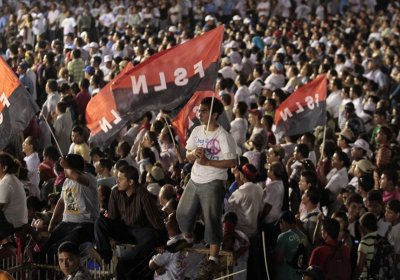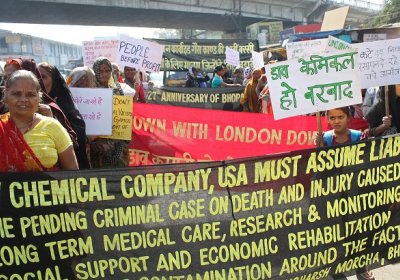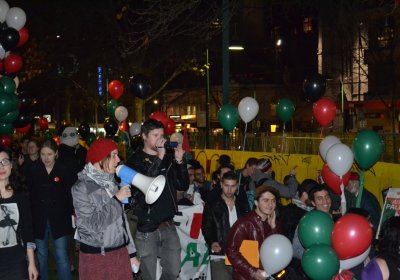As Rocky Mountaineer’s lockout of award-winning on-board staff enters its 10th month, ads are once again being placed to hire more scab workers.
Rocky Mountaineer is Canada’s luxury tourist train that takes tourists throughout the summer months from Vancouver to the scenic Rocky Mountains. Nearly 40% of these visitors to Canada come from Australia.
On June 22 last year, as the Rocky Mountaineer pulled into Kamloops for its overnight stop, regular staff were ordered off the train and sent back to their homes in Vancouver. One hundred and eight staff were locked out.
921
Bolivian President Evo Morales once again used the opportunity of May 1, the international workers’ day, to announce his left-wing government's latest nationalisation. This time, it was the turn of Transportadora de Electridad (TDE), a subsidiary of the Spanish-owned Red Electrica de Espana (REE), which controlled Bolivia’s national electricity transmission grid.
The nationalisation was another step towards meeting the long-standing demand of the Bolivian people to return privatised companies to state hands.
Launched last month, Green Left TV is steadily building up video content on both local and international struggles for justice, to complement the weekly newspaper and Green Left website.
A crew of Palestinian actors and musicians from the Jenin-based Freedom Theatre toured Egypt in April.
The aim of the tour was to conduct a series of “playback theatre” workshops and performances in Cairo and Alexandria. Playback theatre is an interactive theatre approach used as a tool for community building, public dialogue, cultural activism and trauma recovery.
In a playback event, audience members share thoughts, feelings, memories and autobiographical accounts, and watch as a team of actors and musicians instantly transform these experiences into improvised theatre pieces.
On more than one occasion, I have referred to the infamous agreement which the United States imposed on Latin American and Caribbean countries when the Organisation of American States was founded in Bogota on April 30, 1948.
Just by sheer coincidence I happened to be there on that date, helping to organise a Latin American students’ congress with the objective of struggling against European colonialism and the bloody tyranny imposed by the United States in this hemisphere.
Much of the world’s population continues to pay for the global financial crisis with their jobs, homes, education and health. Bankers continue to award themselves millions of dollars in bonuses, such as the British bank Barclay’s chief executive, who last year earned US$26.9 million.
The Venezuelan government, however, has raised the percentage of net profits banks must grant in credit to national social programs. In doing so, it is demonstrating to the rest of the world what a regulated and socially oriented banking system could look like.
Nicaragua's President Daniel Ortega and a crowd of more than 100,000 people gathered on the night of May 2 in Managua's Plaza de la Fe to pay tribute to Tomas Borge.
Borge, who died on April 30 aged 81, was the last surviving member of the group that founded the Sandinista National Liberation Front (FSLN) more than 50 years ago. Borge has always been and remains a symbol of the Nicaraguan Revolution in Latin America and beyond.
The 30th Olympic games will begin in July in London as Britain's Conservative-Liberal Democratic government imposes savage austerity measures on the public. The excitement of watching the world's sporting best compete is mixed with fears of social and economic upheaval.
The British government is projected to spend US$14.5 billion on the games, $9.6 billion over budget. Prime Minister David Cameron announced last November that the budget for the opening and closing ceremonies would be doubled to $125 million.
With the Spanish economy sinking and 12 countries in Europe mired in recession, politicians and bankers are once again worried about a financial meltdown on the continent as the result of the crisis in the eurozone.
Adding to the concerns among politicians and financial policymakers is the prospect that elections in France and Greece on May 6 could upend the austerity packages agreed to by European leaders in December.
For the past 12 weeks, students of Quebec’s colleges and universities have been on strike against Premier Jean Charest’s proposal to increase tuition fees by 75%. The indefinite strike involves more than 170,000 students and is now attracting high school students. Broad layers of the general public are sympathetic to the movement.
The Victorian Coalition government has taken to the state with a razor and announced huge cuts in the 2012 budget. These are the biggest cuts since the Jeff Kennett-led Coalition government that ruled Victoria from 1992-1999.
Victorian TAFE institutes in particular will be hard hit. The level of cuts was so severe that higher education minister Peter Hall sent a letter to TAFE heads on April 29 indicating that he had considered resigning from the ministry.
It would not come as a surprise to many activists, but a little of the close relationship between police and commercial interests has been revealed in the trial of 16 activists charged for taking part in a Palestine solidarity protest outside the Max Brenner chocolate shop in QV shopping centre in Melbourne’s CBD. The trial began on May 1 and is scheduled to last for two weeks.
- Previous page
- Page 2
- Next page








